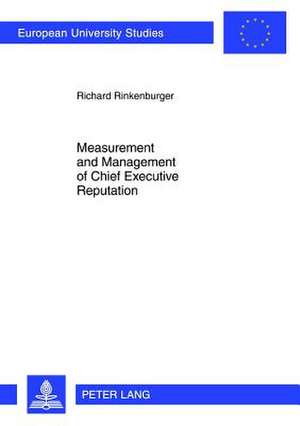Measurement and Management of Chief Executive Reputation: Europäische Hochschulschriften (Reihe 5): Volks- und Betriebswirtschaft ) / European University Studies (Series 5): Economics and Management / Publica, cartea 3408
Autor Richard Rinkenburgeren Limba Engleză Paperback – 4 mar 2012
Preț: 411.20 lei
Nou
Puncte Express: 617
Preț estimativ în valută:
78.68€ • 82.16$ • 64.97£
78.68€ • 82.16$ • 64.97£
Carte tipărită la comandă
Livrare economică 11-17 aprilie
Preluare comenzi: 021 569.72.76
Specificații
ISBN-13: 9783631621899
ISBN-10: 3631621892
Pagini: 206
Dimensiuni: 148 x 211 x 15 mm
Greutate: 0 kg
Ediția:Nouă
Editura: Peter Lang Gmbh, Internationaler Verlag Der W
Seriile Europäische Hochschulschriften (Reihe 5): Volks- und Betriebswirtschaft ) / European University Studies (Series 5): Economics and Management / Publica, Europaeische Hochschulschriften / European University Studie
ISBN-10: 3631621892
Pagini: 206
Dimensiuni: 148 x 211 x 15 mm
Greutate: 0 kg
Ediția:Nouă
Editura: Peter Lang Gmbh, Internationaler Verlag Der W
Seriile Europäische Hochschulschriften (Reihe 5): Volks- und Betriebswirtschaft ) / European University Studies (Series 5): Economics and Management / Publica, Europaeische Hochschulschriften / European University Studie
Notă biografică
Richard Rinkenburger studied business administration at the LMU Munich and the Copenhagen Business School. He wrote his dissertation during his time as a research and teaching assistant at the Institute for Market-based Management at the LMU Munich. At the same time, he worked as a freelance management consultant.
Cuprins
Contents: Theoretical background: Definition, antecedents, consequences, and a structural model of CEO reputation ¿ Methodical background: Specification of latent variables, variance-based SEM, operationalization, and research design ¿ Results and discussion of the empirical study.























